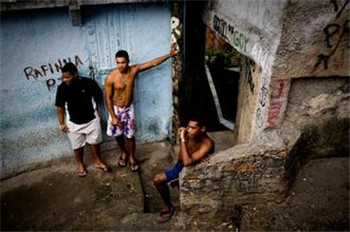(单词翻译:单击)

RIO DE JANEIRO — If battling pickpockets were an Olympic sport, the Brazilian authorities might qualify for a medal.
里约热内卢——如果反扒也是一项奥林匹克赛事,那么巴西官方应该可以赢得一枚奖牌了。
In the face of soaring street crime, the state government has deployed a security force of 85,000 in Rio, among them 23,000 soldiers who stand sentinel at busy intersections or cruise the streets in military jeeps, their weapons aimed menacingly at the sidewalk.
为了应付日益猖獗的街头犯罪,政府在里约部署了多达8.5万人的安保力量,其中有2.3万名军人,他们在繁忙的十字路口站岗,或是开着军用吉普车在街头巡逻,手中的武器威胁地指向人行道。
In one of the more intriguing displays, a Brazilian naval ship has been patrolling along the city’s famed Ipanema Beach.
还有一些更有意思的展示,比如在这座城市著名的依帕内玛海滩(Ipanema Beach),有一艘军舰沿着海岸线巡逻。
Still, the overwhelming show of force has not exactly vanquished crime. The chief of security for the opening ceremony was mugged at knifepoint on Friday night as he left Olympic Stadium; a stray bullet landed in the equestrian arena’s media tent on Saturday, just missing a New Zealand sports official; and on Saturday night, Portugal’s education minister was assaulted as he strolled along Rio’s upscale lagoon, site of the rowing competition.
然而,大量的武力展示并没有完全击败犯罪。开幕式的安全主管周五在离开奥林匹克体育场时遭到了持刀抢劫;星期六,一颗流弹击中了骑马赛事场馆外的媒体帐篷,差点击中一位新西兰体育官员;星期六晚上,葡萄牙教育部长在里约的高档环礁湖一带散步时遭遇袭击,这里也是赛艇赛事的主办地点。
In their preparation for the Olympics, Brazilian officials confronted a number of challenges that had spooked some international visitors, including fears over the Zika epidemic, the threat of terrorist attacks and unflattering news media reports that drew attention to the city’s polluted waters.
在筹备奥运会的过程中,巴西官员们曾面临一系列挑战,这些问题吓坏了不少外国游客,比如说对兹卡(Zika)病毒的恐慌,恐怖主义袭击的威胁,以及关于城市水污染那些毫不客气的新闻报道。
But it is the recent surge in street crime that has most unnerved city officials and residents, who worry that an embarrassing spike in lawlessness could dent the pride and euphoria that have taken hold here since the Summer Games began on Friday night.
但最近涌现的街头犯罪,才是最令这个城市的官员与居民们焦虑的问题,不法行为的激增令人尴尬,自从周五夏季奥运会开幕以来,这座城市里一直萦绕着骄傲与狂欢的气氛,他们担心这样的气氛会遭到破坏。
Despite the most recent incidents, including a bomb scare Saturday near the finish line of a men’s cycling race, most visitors and residents say they feel safe. “This must be the safest place in Brazil right now,” said Isabela Carvalho, 46, an ice cream vendor, as military police officers sped by on motorcycles, sirens wailing.
尽管有最近的那些事故,包括周六发生在男子自行车赛终点线附近的炸弹恐慌,大多数游客和居民还是说,他们觉得很安全。“现在,这里可能是全巴西最安全的地方了,”46岁的冰淇淋小贩伊莎贝拉•卡瓦略(Isabela Carvalho)说,这时街头有一群警察骑着摩托车,鸣着警笛呼啸而过。
But the show of force has also drawn criticism from human rights activists who fear that overly aggressive policing might lead to abuses, especially in the city’s low-income communities, known as favelas.
但是武力的展示也招来人权活动人士的批评,担心过分强硬的治安管制会导致权力滥用,特别是在通常被称为“贫民窟”(favelas)的那些低收入社区。
Last week, a joint police and military operation in one such neighborhood, Complexo do Alemão, left two people dead.
阿莱茂住宅区(Complexo do Alemão)就是这样的一个社区,上星期,军方和警方在这里举行了一场联合行动,两人丧生。
Officials have sought to reassure visitors, pointing out that the security force is more than twice the number dispatched during the London Olympics of 2012. They also note that Rio has successfully hosted other large sporting events, including the 2014 World Cup.
官方努力安抚游客们,指出这届奥运会的安保力量是2012年伦敦奥运会的两倍还要多。他们还指出,里约曾经成功地举办过不少体育盛事,包括2014年足球世界杯。
The city’s security woes have been exacerbated by a severe budget crunch, which has hampered the government’s ability to pay police officers. The sense of crisis was underscored in June, when the state government declared a “financial calamity.”
由于预算缩减,政府难以向警察支付薪资,因此这座城市的安全问题进一步激化。自6月政府宣布“金融灾难”后,人们便开始感到了危机。
In recent weeks, police officers who said their salaries had been delayed or only partially paid demonstrated at Rio’s international airport, holding up signs for arriving passengers that read, “Welcome to hell.”
最近几周以来,一些迟迟未能拿到薪资,或是只拿到部分薪资的警察在里约国际机场示威,向抵达机场的旅客们举着“欢迎来到地狱”的标语。
Fábio Neira, a civil police commissioner, said the late paychecks had dampened morale. “This creates a huge financial difficulty for us because you have to pay your bills, electricity and rent at the beginning of the month,” he said in an interview.
一位名叫法比奥•内拉(Fábio Neira)的警局局长说,欠薪令警察们士气低落。“这给我们带来了极大的财政困难,要知道月初时你还得付账单,交房租和电费,”他在采访中说。
Although the federal government subsequently provided an $850 million bailout to pay for security costs during the games, Neira said the money did not cover overtime worked in May or June.
尽管联邦政府后来拨了8.5亿美元的紧急财政援助,用于奥运会期间的安保费用,内拉说,这些钱连支付在五六月期间超时工作的工资都不够。
Working conditions, he added, remain abysmal, noting that some police stations lacked pens, toilet paper or money for gas.
他补充说,工作环境仍然糟糕透顶,有些警察局连笔和手纸都没有,甚至没钱给车子加油。
Although the Brazilian news media tends to focus on brazen street robberies or violence that occurs in the city’s wealthier neighborhoods, experts say it is Rio’s poor residents who bear the brunt of increased crime.
巴西媒体更倾向于关注肆无忌惮的街头抢劫,以及发生在城市较为富有地区的暴力事件,但专家们说,受犯罪率上升影响最大的还要算是里约的贫民。
Professor Julita Lemgruber, coordinator of the Center for Studies on Public Security and Citizenship at Candido Mendes University in Rio, said the rise in street crime was partly tied to failed efforts to improve public security in the city’s favelas.
里约坎迪杜•门德斯大学公共安全与公民研究中心协调员朱莉塔•伦格鲁贝(Julita Lemgruber)教授说,街头犯罪的上升,部分与官方未能成功改善贫民窟地区的公共安全有关。
In 2008, the state of Rio de Janeiro began an ambitious initiative, creating Police Pacification Units, which were responsible for combating drug gangs that had been operating with impunity. The program, which also relies on community policing and social work, is cited in Olympic documents as an important factor in addressing the city’s long-standing security concerns.
2008年,里约热内卢州开展了一项雄心勃勃的行动,它创立了“警方平定小队”(Police Pacification Units),旨在打击有恃无恐的贩毒团伙。这个计划还有一系列治安管理和社会工作作为基础,奥运会文件中曾经大量引用这项行动,证明这个城市有安全方面的长远打算。
Atila Roque, the executive director of Amnesty International in Brazil, said the program has been riddled with abuse and had exacerbated tensions between the police and residents, some of whom have called for an end to the effort.
国际特赦组织(Amnesty International)驻巴西执行总管阿蒂拉•罗克(Atila Roque)说,这项计划中充满滥用权力,激化了警察和居民之间的矛盾,有些人已经呼吁早日结束这个行动。
Last year the police were responsible for 20 percent of the city’s homicides, according to Amnesty International, which used data from the state’s Public Security Institute. There were 645 police killings last year, compared with 400 in 2013. The number of those who died at the hands of the police between April and June of this year doubled from the same period last year, according to the data.
国际特赦组织引用巴西公共安全部的数据,称去年这座城市里的杀人案中,有20%是由警察导致的。去年有645起警察杀人事件,2013年这个数字是400起。根据这些数据,今年4月到6月,死于警察之手的人数是去年同期的两倍。
Most of the dead were young black men.
其中大多数死者是年轻的黑人男性。
One of the communities hit hard by police violence is Maré, a sprawling favela that sits between Rio’s international airport and the affluent neighborhoods of Ipanema and Copacabana. The authorities have long struggled to contain the violence spawned by warring drug traffickers and militia groups. In the months before the World Cup, the army occupied the community for a year.
马雷(Maré)是遭受警察暴力尤为严重的社区之一,这个杂乱无章的贫民窟坐落在里约国际机场与依帕内玛和科帕卡巴纳的富人区之间。这里的贩毒团伙和民兵组织之间经常发生暴力冲突,政府早就想控制局面。世界杯之前的几个月,军队占领了这个社区,驻扎一年。
Eliana Sousa Silva, who was raised in Maré and is the founder of a local nonprofit group, said police operations there became more frequent as the Olympics approached. Late last month, journalists living in the neighborhood reported three straight days of police operations that involved heavy gunfire.
埃利安娜•索萨•席尔瓦(Eliana Sousa Silva)在马雷长大,是本地一个非盈利组织的创始人,她说随着奥运到来,警察的行动也愈来愈频繁。上月月底,住在附近的记者报道,警察的行动持续了整整三天,还出动了重型武器。
“The Olympics, like the World Cup and other mega events in Rio, are always a tense moment for residents of Maré,” she said, adding that police operations are often heavy handed. “The government needs to ensure nothing happens, in order to show Rio to the world.”
她说,“奥运会和世界杯以及里约举办的其他盛事一样,对于马雷的居民们来说都是非常紧张的时刻。”她又补充说,警方的行动一般都非常严厉。“政府想保证什么事也不出,就为了向世界展示里约。”


